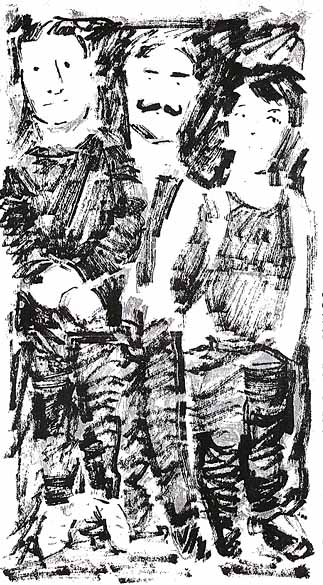Nobody does it better than Hüsker Dü
THE MODERN BEATLES
•By Robert Allen

Warehouse: Songs and Stories
Warner Brothers (LP)
Mould's songs tend toward the reflective, though the stark Plastic Ono Band-style self-dissection of Candy Apple Grey (Hüsker Dü's previous LP) is somewhat tempered. Mould is sensitive without an ounce of sentimentality. Songs such as "Bed Of Nails" and "Turn It Around" almost make you give the guy a mental hug just to tell him it's OK to be depressed. Mould's self-questioning is practically unique, in that his ideas make sense, and any trace of self-pity is usually washed away in a surge of power chords.
Hart also has that aspect to his writing, but he's often a lot more fun. The sixties references that crop up in Hüsker Dü's music do so usually in Hart' songs. "She Floated Away" captures more of the Byrds' spirit than

The potential heirs to Holly, Fogerty, and Springsteen (he is 37, folks) are out there, if you look hard enough. And almost every worthwhile American band of this decade — from X to the Replacements to Romeo Void — has had one thing in common. And that is that all have built a following on independent labels and switched to the majors — making a lot of wonderful music, but not setting the cash registers on fire. Hüsker Dü is following in those footsteps, but the best band in America may finally break the mould. Despite the lack of an obvious single, Warehouse: Songs And Stories may actually sell some copies.
Hüsker Dü's last five albums represent one of the most brilliant hitting streaks in rock. Starting with Zen Arcade, an all-over- the-place smorgasbord that lifted them above being merely a
"Hüsker Dü's last five albums represent one of the most brilliant hitting streaks in rock 'n' roll."
Warehouse is the most conventional album Hüsker Dü has made. This has nothing to do with the idiotic concept of "selling out." It merely means that it's a cohesive collection of medium-length songs veering neither to thrash nor dirges. It helps to look at Zen Arcade to see what Warehouse is missing. It lacks thirteen-minute-long instrumentals, backward mixing, pint-sized hardcore blasts or acoustic folk songs. What remains is some marvelously inventive music, delivered with a combination of power and grace unmatched by any active American band.
Guitarist Bob Mould and drummer Grant Hart split the writing and singing chores
Warehouse has lyrics of such insight and intimacy that it becomes the first Hüsker Dü album where the words take center-stage from the music. But that music contains so many magical moments of aggression and tenderness that I can recommend it as easily as drifting away on the lazy chords of Warehouse's best, most sublime song — with "No Reservations."